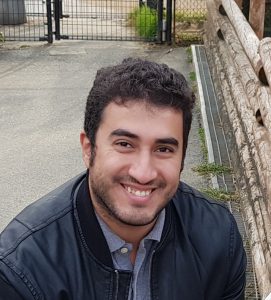Ahmed Ali: Plant Physiology First Author

 Ahmed Ali, first author of “Tracking metabolites at single-cell resolution reveals metabolic dynamics during plant mitosis”
Ahmed Ali, first author of “Tracking metabolites at single-cell resolution reveals metabolic dynamics during plant mitosis”
Current Position: Assistant Professor, Analytical Biosciences and metabolomics, LACDR, Leiden University:
Education: PhD Biomedical sciences, Hiroshima University, Bsc in Pharmaceutical sciences, Misr International University.
Non-scientific Interests: Reading, gaming, traveling
Ahmed Ali is an assistant professor of Biomedical Sciences at LACDR, Leiden University. He Leads single cell research in the Analytical Biosciences and Metabolomics group, he is a visiting researcher at Shimizu’s group, BDR, RIKEN, Japan, and Misr International University, Egypt. His research involves developing innovating analytical methods tailored for small-volume, or single cell analysis to enable metabolomics-driven systems biology in personalized health strategies.
He leverages his multidisciplinary background in analytical chemistry, pharmacy, biomedical science, and data science to develop novel single cell metabolomics techniques, investigate cellular heterogeneity, as well as cell migration and metastasis. This is enabled by the combination of advanced sampling, and sample handling techniques, patient-derived organ on chip models, 3D organoids, mass spectrometry, and data analysis techniques.
In recent years, Ahmed, and his collaborators developed single-cell analysis protocols that allowed him to showcase the diagnostic potential of single-cell metabolomics. This was shown by isolating and analyzing circulating tumor cells obtained from the blood of cancer patients, where the resulting metabolic profile can be used as a diagnostic biomarker for cancer diagnosis in the future. To investigate the intracellular heterogeneity of metabolites in a single cell, he utilized an integrated 3D tomographic mass spectrometry platform that was used to quantify metabolites in 3D space with sub-cellular resolution. Furthermore, He developed an integrated single-cell Raman spectroscopy, and mass spectroscopy platform where the effect of drugs on single-cells can be measured in a noninvasive manner by Raman spectroscopy, followed by qualitative and quantitative analysis of the drug and its metabolites in the same cells.
He is currently leading efforts to develop a fully automated, multi-modal single-cell analysis platform. In which, individual cells will be measured by different imaging techniques, then, sampled and processed via microfluidics, and eventually measured by mass spectrometry, where the data will be analyzed by an automated data processing and analysis package developed in R. This platform will be used to investigate possible metabolic biomarkers for cancer resistance in cancer organoids, and the role played by the metastatic niche in cancer metastasis in patient-derived cancer immunology organ on chip models.



